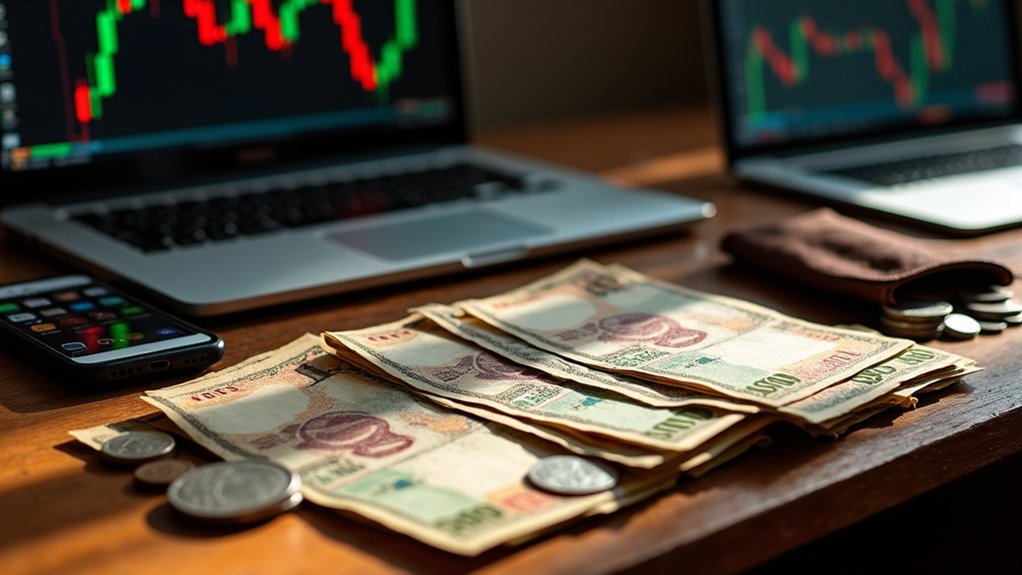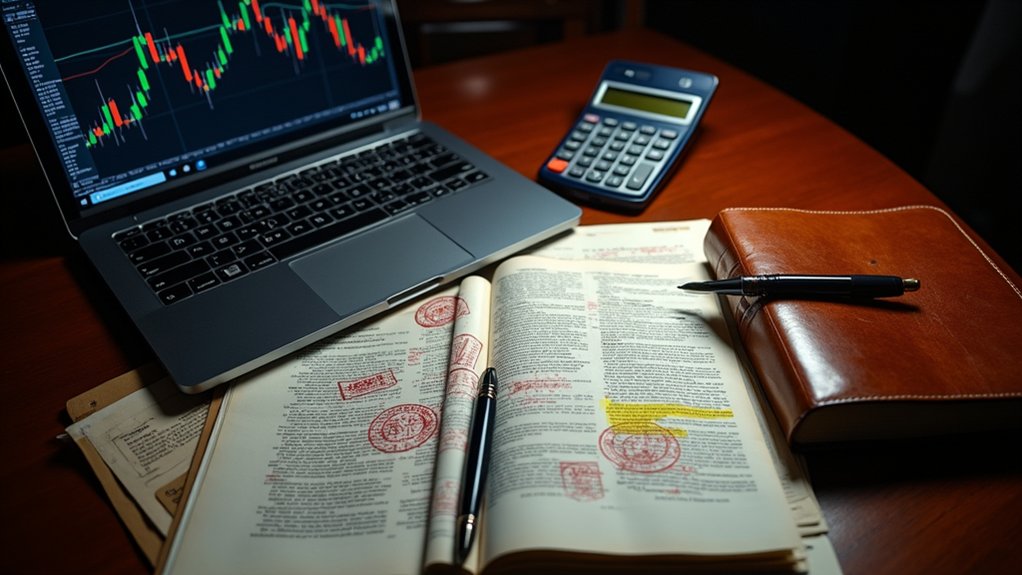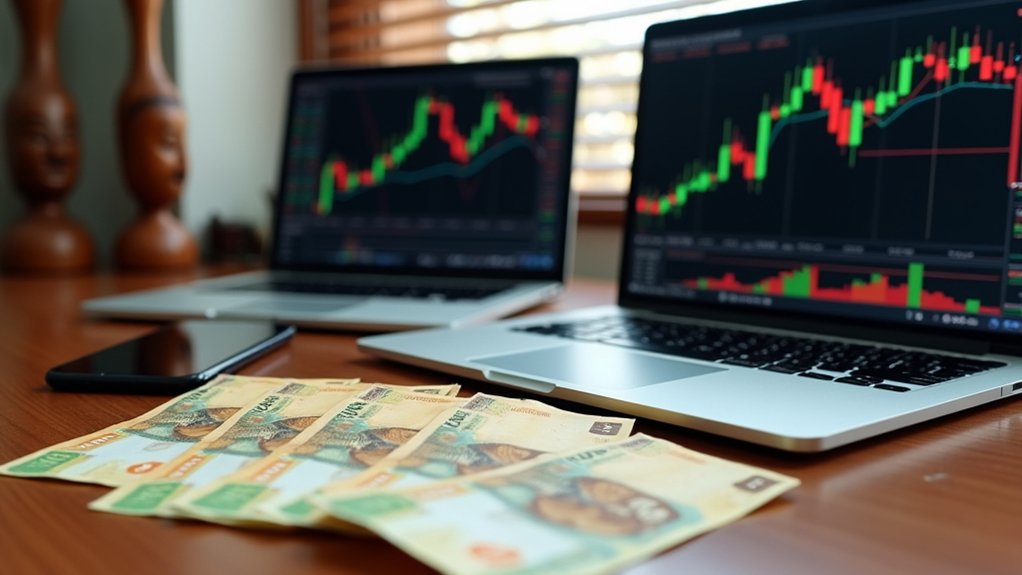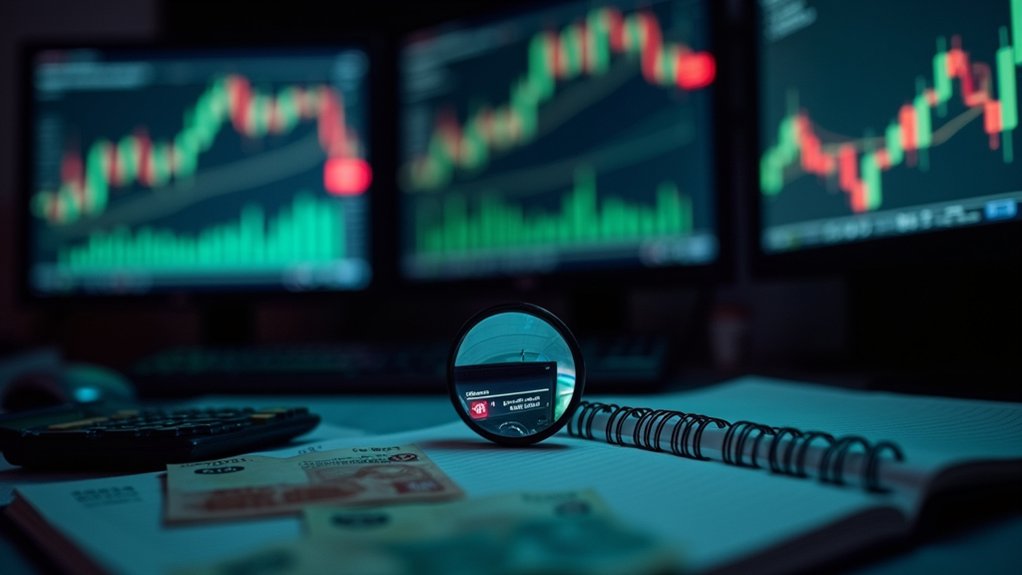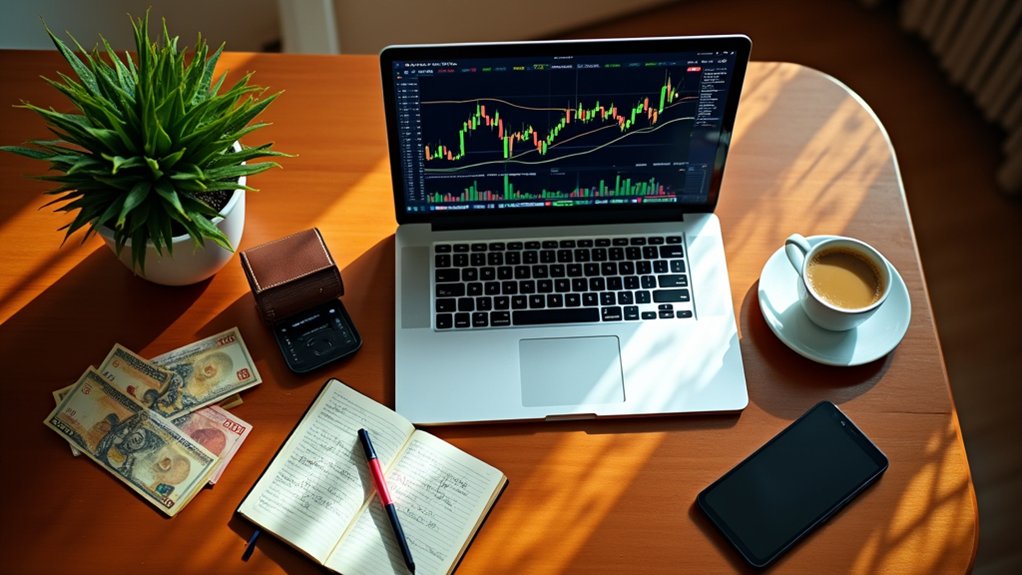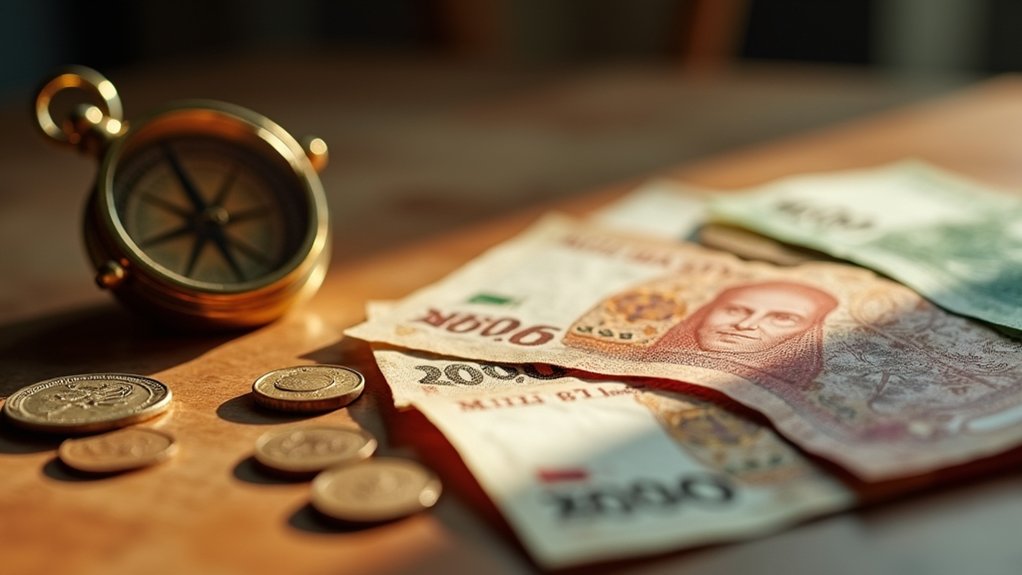Forex trading is legal in Sierra Leone, but calling it “regulated” would be generous. The Bank of Sierra Leone issues licenses and oversees monetary policy while the Securities Commission handles capital markets, yet the framework remains skeletal at best. No dedicated regulator exists, leaving retail traders exposed to unscrupulous brokers who inflate balances with fake trades, then vanish when withdrawal requests arrive. The Leone's collapse from 22 to over 23,000 per USD since 1988 adds currency risk on top of fraud risk. The gap between legal status and actual protection creates a playground for scams that drain accounts fast—understanding how this contradiction works matters more than the technicalities suggest.
Quick Facts That Matter
- Forex trading is legal in Sierra Leone, yet the market remains largely unregulated, exposing traders to widespread fraud despite government oversight.
- BSL issues broker licenses and conducts compliance reviews, but robust investor protection frameworks and enforcement mechanisms remain critically limited.
- Brokers advertise low minimum deposits and fast account activation, but hidden withdrawal fees and exchange rate losses significantly reduce actual returns.
- Fraudulent operators inflate account balances with fake trades, then block legitimate withdrawal requests before disappearing with deposited funds.
- Cash-dominated transactions, minimal AML controls, and informal economy conditions create systemic vulnerabilities enabling money laundering through forex channels.
Overview: Forex Trading in Sierra Leone
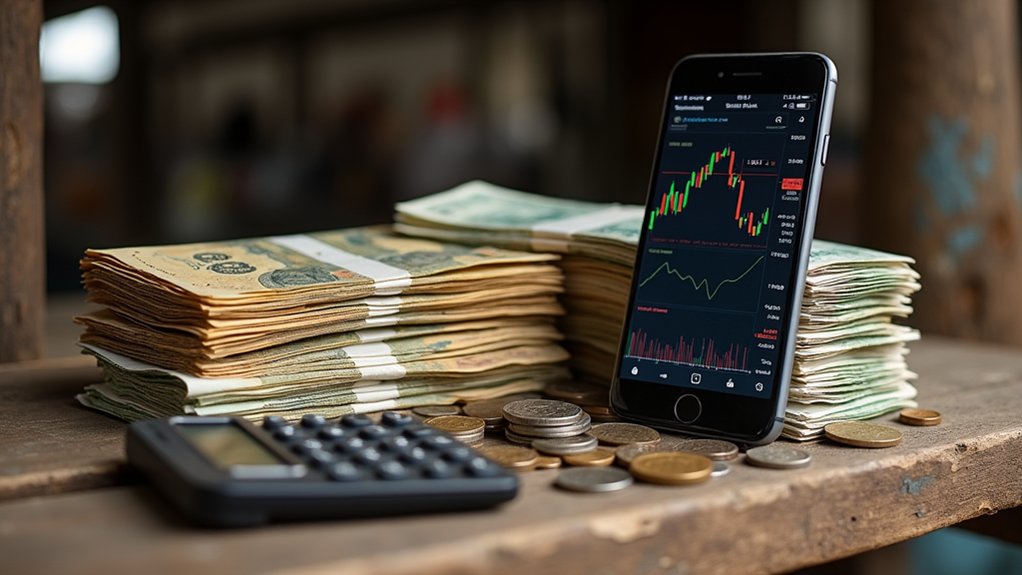
In a nation where the stock market barely registers a pulse, forex trading has emerged as Sierra Leone‘s unexpected financial frontier. The Leone has depreciated from 22.557 per dollar in 1988 to over 23,000 today—a trajectory that makes currency speculation look almost inevitable.
Platforms like Wealthway FX and established brokers including Fusion Markets now offer 60+ currency pairs to traders who previously had limited investment options. It's accessible. It runs 24 hours. And it's caught the attention of investors navigating an economy where traditional asset choices remain frustratingly scarce. Understanding exchange rate dynamics is crucial for traders operating in markets characterized by such significant currency volatility.
The transformation happened faster than anyone expected. The currency hit 22,832.420 per USD in February 2025, marking the weakest exchange rate in Sierra Leone's recorded history.
Is Forex Trading Legal in Sierra Leone?
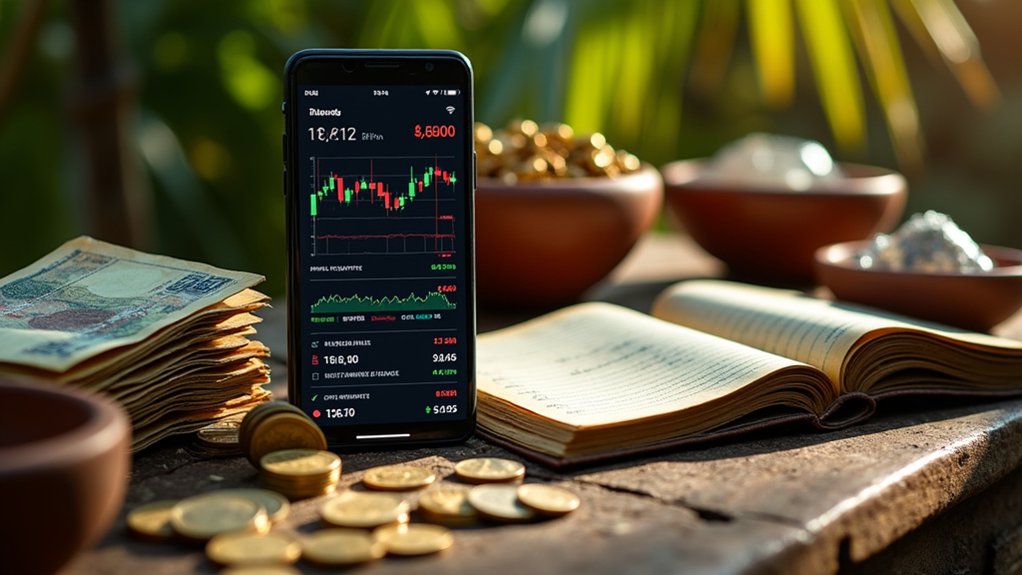
Yes, forex trading is legal in Sierra Leone—flat-out legal, no asterisks required. No government prohibition exists.
Traders can access the global OTC market without breaking laws. Simple as that.
But here's the kicker: legal doesn't mean regulated.
The Bank of Sierra Leone handles monetary policy, not forex broker oversight. No dedicated regulatory body exists for brokers. No licensing framework either.
However, the Securities Commission does control the capital market and sets requirements for brokerage activities in the country.
This means traders must navigate currency exchange trading through international platforms rather than locally regulated ones.
Who Regulates Forex Trading in Sierra Leone?
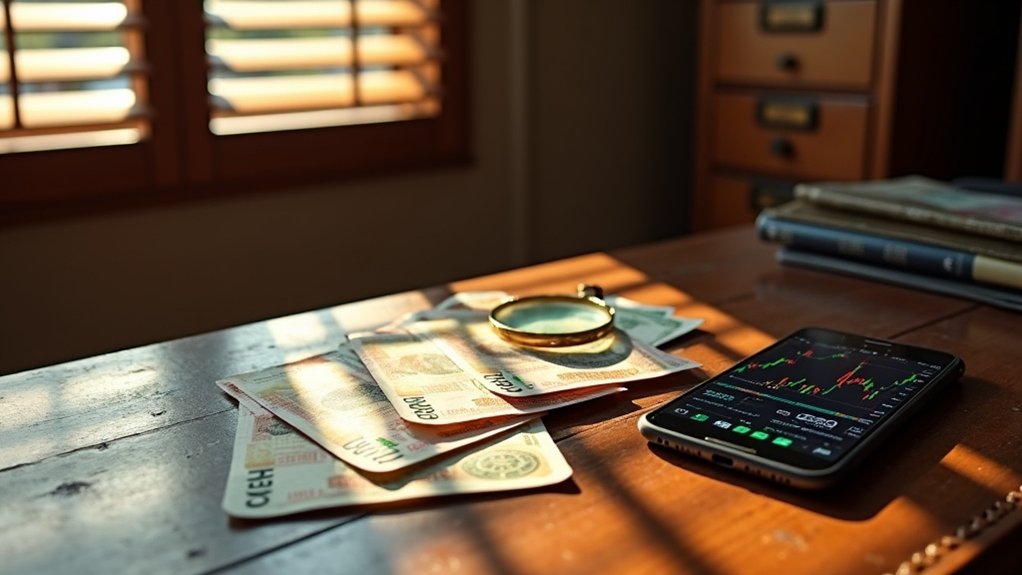
The Bank of Sierra Leone (BSL) runs the show. Period. They write the rules, hand out licenses, and keep watch over everything forex-related in the country.
Want to operate as a broker? You'll need BSL approval first. They don't mess around with investor protection either—fraudulent activities get shut down fast.
The BSL also handles monetary policy, manages foreign exchange reserves, and steps in when exchange rates go haywire.
Regular compliance reviews? Check. Enforcement actions for rule-breakers? Absolutely. They're basically the gatekeeper, watchdog, and referee rolled into one regulatory authority.
The BSL maintains compliance requirements that brokers must meet to ensure they operate within established legal frameworks. Beyond enforcement, the BSL runs consumer education initiatives to help traders understand forex risks and their rights in the market.
How Forex Trading Works in Sierra Leone
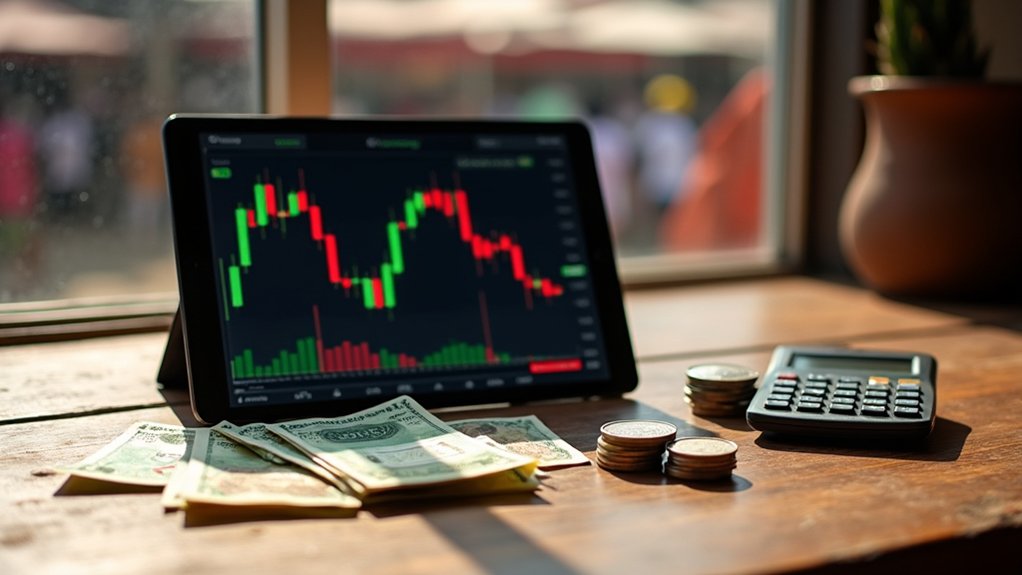
Unlike traditional stock markets with their fancy buildings and trading floors, forex in Sierra Leone happens in a completely decentralized digital space. No central exchange. No physical location. Just electronic networks connecting traders across the globe, 24/5.
Everything runs through computers and online platforms—MT4, MT5, broker apps. The whole thing operates over-the-counter, which is just financial jargon for “directly between parties.”
Trades execute in real-time through digital infrastructure. The market never sleeps, moving continuously across international time zones.
It's separate from stocks or commodities, operating with its own distinct mechanisms. Understanding the forex market structure—including its participants like banks, institutional traders, and retail traders—helps beginners navigate this decentralized environment more effectively. Pure digital trading. The Bank of Sierra Leone regulates forex and CFDs trading activities, issuing licenses to brokerages operating within the jurisdiction.
Best Time to Trade from Sierra Leone
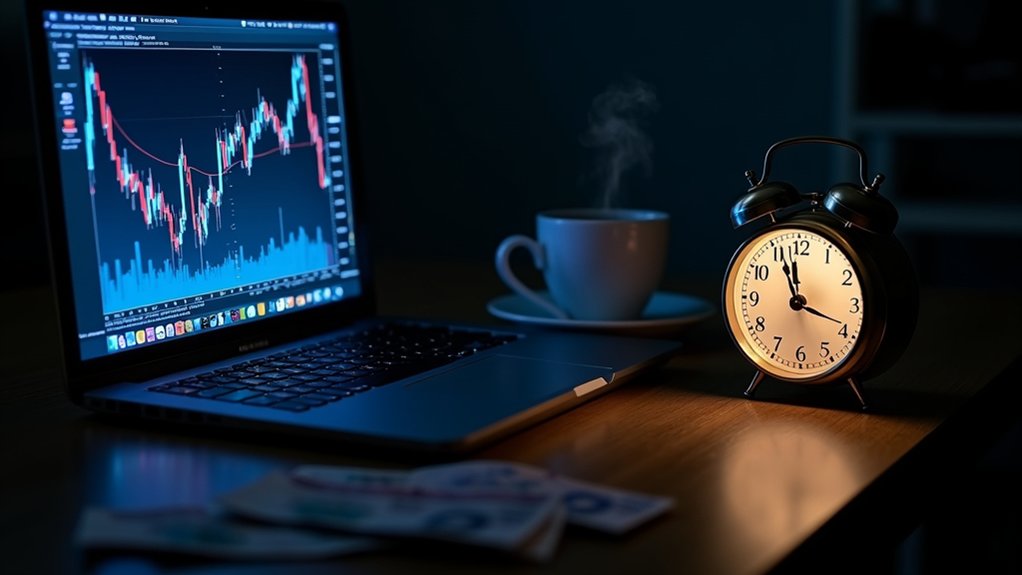
Understanding how the market works means nothing if traders don't know when to actually execute those trades.
Sierra Leone sits in GMT year-round—no daylight savings nonsense.
The London-New York overlap (13:00-17:00 GMT) delivers maximum liquidity and volatility. That 9:30-10:30 a.m. ET window? Premium territory.
Early mornings (6:00-10:30 GMT) catch the London close and New York open.
Asian session (midnight-9:00 GMT) offers stability, lower volatility.
August sucks—institutional traders vanish on holiday, spreads widen, liquidity tanks.
EUR/USD and GBP/USD perform best during London hours. Most currency pairs move between 50 and 100 pips on a typical trading day.
Aligning trades with peak activity hours for specific currency pairs maximizes opportunities and reduces execution costs.
Weekend? Market's closed.
Friday 22:00 GMT through Sunday—nothing happens.
Payments, Deposits and Withdrawals in Sierra Leone
Moving money in and out of a forex account from Sierra Leone? XM lets you start with just $5. Yes, five dollars. But watch the fine print—withdrawals under $200 cost $15. Ouch.
Exness and Hantec Markets skip fees entirely. Skrill and bank cards work fine here. Processing? XM activates accounts in 24 hours. Exness moves faster. Currency conversions happen in USD, EUR, sometimes GBP. The Leone exchange rate dictates what you actually get.
Fast deposits mean nothing if withdrawal fees eat your profit. Beyond comparing costs, verify your broker uses secure withdrawal methods that protect against fraud when transferring earnings to your bank account. Math matters more than marketing promises.
Taxes, Reporting and Money Rules in Sierra Leone
Depositing money is easy. Figuring out taxes? That's where Sierra Leone gets interesting. Retail traders must comply with local taxation rules for currency speculation—no surprise there. But here's the kicker: the market remains largely unregulated despite its legal status. The Central Bank of Sierra Leone and Securities Commission coordinate oversight, yet robust frameworks remain absent.
Finance Act 2025 offers generous tax incentives—125 percent deductions for R&D, five-year exemptions for qualifying businesses—but these target larger operations. Individual forex traders navigate a gray zone. Clear reporting guidelines exist for brokerages. For everyday retail traders? Less certain. Central banks in West Africa employ various monetary policy tools to manage currency stability and foreign exchange market operations, though implementation varies significantly across the region.
Forex Trading Scams and Risks in Sierra Leone
Spotting a forex scam in Sierra Leone shouldn't require a PhD in finance, yet traders fall victim daily. Fraudulent brokers build polished websites, hire friendly customer service reps, and promise returns that would make Warren Buffett jealous.
The playbook never changes: deposit funds, watch fake trades multiply your balance, then hit a brick wall when requesting withdrawal. These operators vanish faster than morning mist. When brokers block withdrawals, traders should immediately contact the broker in writing, file complaints with regulatory authorities, and consider legal remedies to recover their funds. Account takeover attacks can drain accounts with significant liquidity quickly, leaving traders with empty balances before they realize their credentials have been compromised.
Meanwhile, legitimate concerns plague the sector. Foreign exchange bureaus operate with minimal AML/CFT controls, cash dominates transactions, and the country's large informal economy creates perfect conditions for money laundering. Staff complicity at banks doesn't help either.
Quick Q and A
Can I Trade Forex in Sierra Leone Using Mobile Money Like Orange Money?
Information about Orange Money integration with forex platforms in Sierra Leone remains unavailable in current sources. Traders should contact individual brokers directly to confirm accepted payment methods, as mobile money options vary by platform and continue evolving regionally.
Do Sierra Leonean Banks Allow International Wire Transfers to Forex Brokers?
Sierra Leonean banks generally permit international wire transfers to forex brokers, though individual banks may impose restrictions or require documentation. Traders should confirm their bank's policies, as processing times and fees vary markedly between institutions.
What Internet Speed Is Needed for Reliable Forex Trading in Sierra Leone?
Reliable forex trading typically requires minimum speeds of 1-5 Mbps with stable, low-latency connections. Retail traders in Sierra Leone should prioritize connection stability over peak speeds, as platforms like MT4 and MT5 demand consistent uptime for order execution.
Are Forex Trading Profits in Leones Treated Differently Than USD Profits?
Sierra Leone's tax authorities do not differentiate forex profits by currency denomination. All trading gains, whether realized in Leones or USD, are subject to the same income tax regulations under current Sierra Leone revenue law.
Can I Open a Forex Account if I Only Have a National ID Card?
Most brokers accept national ID cards for account opening, but requirements vary by broker. Traders should verify specific documentation needs directly with their chosen broker, as some may request additional identification or proof of address documents.
The Bottom Line
Forex trading in Sierra Leone works—technically. But “technically” carries a lot of weight here. Legal? Yes. Easy? Not remotely. The regulatory vacuum, patchy internet, payment headaches, and scam exposure create friction at every turn. What looks like a simple online activity from the outside becomes a test of patience and resourcefulness on the ground. The obvious path rarely exists. Traders here know that better than anyone.
